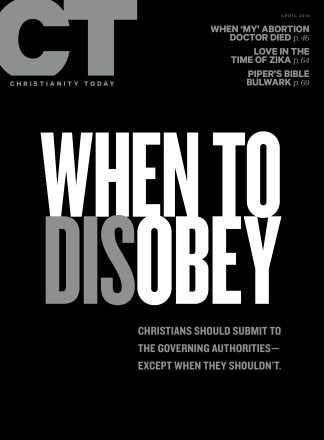W hy this cover story at this time? We are not advocating a particular action for a particular cause. But the title is meant to suggest that we live in a time when there will be particular causes that very well may require Christians’ civil disobedience.
Is that because we now live in a post-Christian society? Not necessarily, Christians were ferrying black slaves on the Underground Railroad in a country powerfully shaped by the Second Great Awakening. And Christians led the civil rights movement at a time when the public square was dominated by, as sociologist Will Herberg’s classic put it, Protestant-Catholic-Jew.
Luther’s “Here I stand, I can do no other” in the face of papal authorities is in many ways our watchword. Protestants are protesters. Civil disobedience runs in our blood.
Protestants are protesters. Civil disobedience runs
in our blood.
Of course, we must choose our moments; we are called to “obey the governing authorities” (Rom. 13) and should first exhaust other means. Not every injustice requires a protest. Most of the time, working the system can work wonders.
But there are times when it doesn’t, and those in power need to be startled into paying attention to injustice. “Nonviolent direct action,” wrote Martin Luther King Jr. in his Letter from a Birmingham Jail, “seeks to create such a crisis and establish such creative tension that a community that has constantly refused to negotiate is forced to confront the issue.” Christians are called to be peacemakers, yes, but sometimes the path to peace is strewn with crises and tensions that we peacemakers create.
But not all of us. There are times and seasons. Those responsible for the financial and emotional welfare of spouses and young children may not be able to risk even a night in jail. And this illuminates why civil disobedience is a churchly act, something the Christian community does together. We tend to think of it as brave individualism. But if it takes a village to raise a child, it takes a church to effectively protest injustice. Some will suffer jail time or onerous fines, while others offer childcare, prepare meals, or help pay fines. Nearly every 1960s civil rights activist sitting in jail was surrounded by a supportive and praying church.
Prayer, of course, is not an afterthought, merely a technique to comfort those jailed. Christian civil disobedience is nothing but anarchy if not done in obedience to the real Sovereign. It’s not an angry reflex or only a community act, but an act of faith discerned through prayer. And it is performed as obedience worked out in love—love of God and even for the institutions and people who thwart justice.
If civil disobedience is in our blood, the love of God is the heart that pumps justice through our veins.
Mark Galli is editor of Christianity Today.









